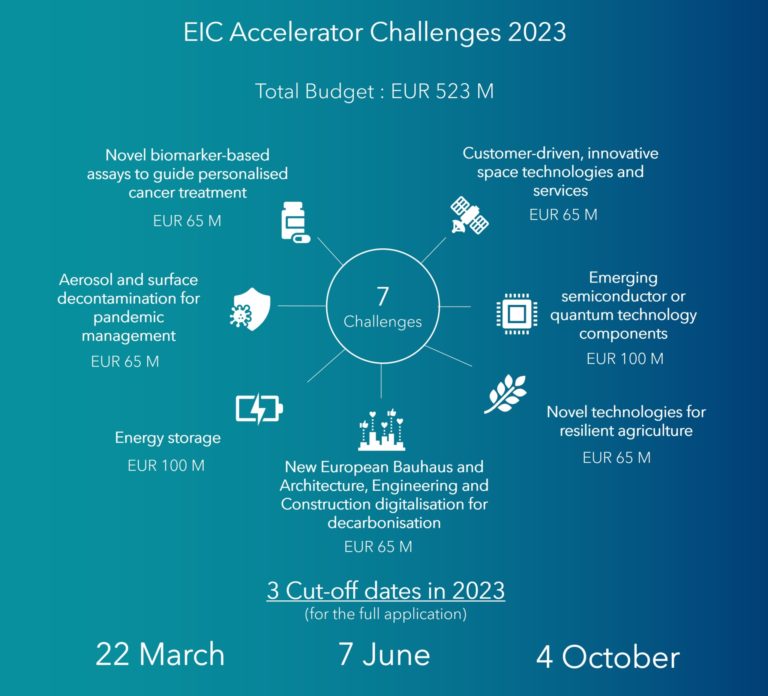
Do data centres truly improve sustainability?
Do data centres truly improve sustainability? Fernando GómezSettings The rise of Industry 4.0 and the increasing use of new technologies have created a significant dependence
The EIC Accelerator, like its predecessor the SME Instrument, is very well known for allowing to fund single entity bottom-up disruptive innovations, allowing to build future tech champions in Europe.
In order to flag priority areas to be funded under this very competitive instrument the EC finances projects falling into several topics, i.e the EIC Accelerator Challenges. In 2023 half of the EUR 1.13 billion budget Accelerator programme, i.e. EUR 523.5 million, will be allocated to projects in one of the 7 Challenges defined in the yearly work programme.The interest of applying to one of challenge is that the competition is likely to be lower than in the Open call.Innovative SMEs (including start-ups, spinouts) and small midcaps can apply to one of the following challenges in the 3 deadlines available in 2023 (22 March, 7 June, 4 October):

Objectives: this challenge aims to improve the efficacy, safety and uptake of therapeutic approaches against refractory cancers, using novel comprehensive predictive, prognostic and companion diagnostic tests, in the context of precision oncology.
It will support and accelerate the preclinical validation and/or clinical phase 1 work necessary to develop novel predictive, prognostic and companion diagnostic assays to guide cancer treatment with the following specific objectives: identification of who is more likely to benefit from a given treatment, who is more likely to develop cancer, and who is more likely to recur or develop side effects as a result of the treatment.
Expected impact: improve the success rate of oncology treatments and to optimise treatment for cancer patients, by increasing the use of predictive biomarkers molecular testing.
Indicative budget: €65M
Objectives: this challenge targets the development and commercialisation of technological solutions facilitating social interaction in the context of pandemic emergencies, by means of one or more of the three following approaches:
Expected impact: reduce the need for social distancing in the event of infectious pandemics and empower society at large to sustain unaltered economic and social dynamics in the event of pandemic outbreaks.
Objectives: This challenge targets groundbreaking innovations in any field of technology that have a high potential to meet the following objectives:
Expected impact: enhance the possibility to store electrical or thermal energy at low cost, high density, high charging/discharging efficiency and for different duration (from short to long) to set up flexible energy systems and increase Europe’s energy independence from unreliable suppliers
Objectives: provide transformative digital products or digitally enabled solutions for the Architecture, Engineering and Construction (AEC) sector that can help it achieve climate neutrality while striving to comply with or contribute to the human-centred quality values and principles brought forward by the New European Bauhaus, in the areas of:
This challenge will ideally attract a range of pioneering companies in the areas of design, fabrication and materials for AEC that aim at deployment of novel and disruptive solutions building upon the latest deep-tech developments in these areas.
Expected impact: reduce or eliminate the embodied CO2 emissions of buildings by enabling the use of less materials and / or of alternative materials, as well as eliminating the waste of the current AEC fabrication practices.
Objectives: This challenge addresses two areas contributing to the objectives of the EU’s Chips Act by supporting the development of critical technologies to ensure the future open strategic autonomy of the Union:
Emerging semiconductors with the aim of supporting the design and development of innovative semiconductor components and intellectual property for analogue and digital integrated circuits and systems including memory, logic, optical components, and sensors, in relevant technology fields such as: Artificial Intelligence, edge computing, Internet of Things, electric and autonomous vehicles, 5G/6G communication, cybersecurity, health and wellness, environmental sustainability.
Quantum technologies with the aim of supporting the EU in taking a leading role in the development of cutting-edge quantum computing and quantum sensing and quantum communications that can be used in real environment and deployed in various areas.
Expected impact: In the mid to long term, foster the development of the semiconductor chip design ecosystem in Europe by increasing the number of innovative fabless start-ups and semiconductor IP companies in the EU. As well as expand the quantum capabilities of Europe, underpin its economic resilience and digital sovereignty, and pave the way for Europe to be at the cutting-edge of quantum capabilities by 2030.
Objectives: develop solutions contributing to the development of a sustainable agricultural and food production system resilient to environmental and social disruptions. This includes a new generation of technologies, equipment and materials (such as but not limited to soil tillage, crop protection and harvesting machinery and equipment) based on principles of regenerative agriculture and supported by Industry 4.0 technologies and in line with the core principles of Industry 5.0, human- centricity, sustainability, and resilience.
Expected impact: improve the resilience of the European food supply chain and security, notably by improving agricultural productivity and fostering environmentally sustainable technologies, all while regenerating and increasing soil health and ecosystem services. This challenge also aims to contribute to better carbon and nitrogen management practices, to mitigation of climate change and environmental challenges including biodiversity loss and pollution.
Objectives: Ensure Europe is able to service and protect its own Space infrastructure, avoiding the risk of losing its strategic autonomy, and enhance the competitiveness of its space industry by encouraging the emergence of innovative, interoperable, scalable, and autonomous “customer-driven” innovative space technologies and services.
Expected impact: promote affordable and cost-effective on orbit satellite servicing technologies to increase competitiveness of EU space industry.
Indicative budget: €65M
Full details on the EIC Accelerator challenges can be found on the EIC Work Programme 2023

Do data centres truly improve sustainability? Fernando GómezSettings The rise of Industry 4.0 and the increasing use of new technologies have created a significant dependence

Tracking Europe’s Green Transition: Insights from LIFE programme trends (2021–2024) Marie LatourSettings Since the start of the 2021-2027 programming period, the LIFE Programme has financed

Bioeconomía Circular: convergencia estratégica entre la economía circular y la bioeconomía Fernando GómezSettings Both the bioeconomy and the circular economy have gained increasing attention over
